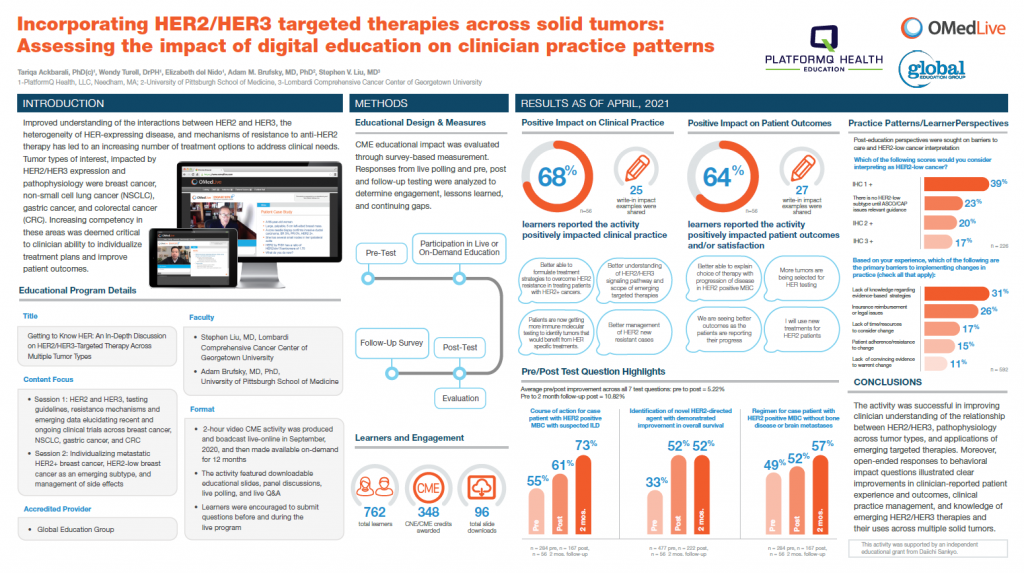PlatformQ Health is pleased to announce the publication of a poster at the 2021 ASCO Annual Meeting. Incorporating HER2/HER3 Targeted Therapies Across Solid Tumors: Addressing the Impact of Digital Education on Clinician Practice Patterns shares insights from a multi-session CME activity, Getting to Know HER: An In-Depth Discussion on HER2/HER3-Targeted Therapy Across Multiple Tumor Types, presented by panelists Stephen Liu, MD, Lombardi Comprehensive Cancer Center of Georgetown University and Adam Brufsky, MD, PhD, University of Pittsburgh School of Medicine.
Some of the most important outcomes from the two-part activity highlight clinician barriers to practice in treating HER2/HER3 Metastatic Breast Cancer. Pre, post, and follow-up responses showed significant baseline gaps regarding course of action for HER2 positive MBC with suspected ILD. Following participation in the education, learners indicated the program’s success in closing these baseline gaps (55% correct at pre-test vs. 73% at 2-months post education). Future education is warranted to reach clinicians to continue to close knowledge and practice gaps. The poster further highlights learner perspectives on HER2-low cancer interpretation.
The education is supported by an independent educational grant from Daiichi Sankyo, Inc.
Have questions about the poster or want to learn more about how PlatformQ Health is delivering impactful education to HCPs and patients? Email us at digital@platformq.com
—————————————————————————————————————————————
Full Abstract
Background: Improved understanding of the interactions between HER2 and HER3, the heterogeneity of HER-expressing disease, and mechanisms of resistance to anti-HER2 therapy has led to increasing number of treatment options to address clinical needs. Tumor types of interest, impacted by HER2/HER3 expression and pathophysiology were breast cancer, non-small cell lung cancer (NSCLC), gastric cancer, and colorectal cancer (CRC). Increasing competency in these areas is deemed critical to clinician’s ability to individualize treatment plans and improve patient outcomes.
Methods: A 2-hour CME activity was broadcast live-online in September 2020 and remains on-demand through September 2021 at OMedLive.com. The educational initiative was divided into one hour addressing HER2 and HER3, testing guidelines, resistance mechanisms and emerging data elucidating recent and ongoing clinical trials across NSCLC, gastric cancer, and CRC. The second hour focused on individualizing metastatic HER2+ breast cancer, HER2-low breast cancer as an emerging subtype, and management of side effects. Knowledge and competence questions were administered pre-, immediate post-, and 2 mos. post-activity. Behavioral impact questions were also asked at follow-up. Data from these questions were analyzed to determine engagement and clinical impact.
Results: To date, 448 clinicians participated in the activity. Across the seven CME test questions, improvements in knowledge and competence were observed in the clinical applications of HER2-directed agents and HER3 antibody drug conjugates (ADCs), first-line standard of care for HER2+ breast cancer, and adverse event management for HER2 ADCs. At 2-mos. follow-up, 67% reported improved behavioral impact on both clinical practice and patient experience and outcomes. Clinicians provided specific write-in examples of these changes, noting improved patient-reported outcomes, improved treatment adherence, improved competence developing treatment plans, and increased understanding of HER2/HER3 pathophysiology. Updated and expanded results will be shared.
Conclusions: The activity was successful in improving clinician understanding of the relationship between HER2/HER3, pathophysiology across tumor types, and applications of emerging targeted therapies. Open-ended responses to behavioral impact questions illustrated clear improvements in clinician-reported patient experience and outcomes, clinical practice management, and knowledge of emerging HER2/HER3 therapies and their uses across multiple solid tumors.

